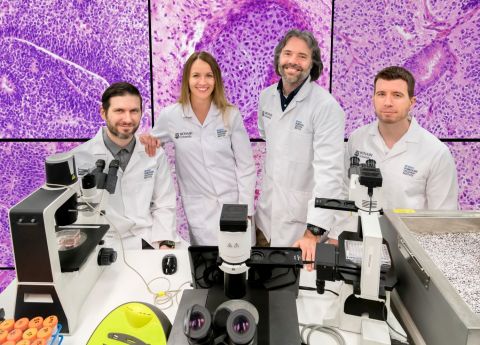Ground-breaking research reveals critical mechanisms of cell reprogramming

In a host of publications spearheaded by Associate Professor Jose Polo from the Australian Regenerative Medicine Institute and the Monash University Biomedicine Discovery Institute, an international team of scientists have uncovered key aspects of cell reprogramming.
Over a decade ago, Japanese scientists described a cassette of four transcription factors that could transform any cell into an induced Pluripotent Stem (iPS) cell. Until recently, precisely how these reprogramming factors functioned have remained a mystery.
“Understanding the mechanisms that underpin cell programming brings us one step closer to regenerating tissue in the clinic to repair or replace damaged organs, to producing tailored cells for use at the lab bench, and to designing drugs that can induce or block reprogramming in target cells,” commented Associate Professor Polo.
With three publications in three esteemed journals, scientists from the Polo group have shed light on the complexities of cell reprogramming.
In work published in the highly regarded journal Cell Reports, the Polo group has unveiled how the genetic and molecular mechanisms involved in generating iPS cells diverge according to the cell type of origin. The findings were led by senior Postdocs Christian Nefzger and Fernando Rossello.
Key stages and differences of the reprogramming process were uncovered through the detailing of the pathway profiles of a range of different cell types, from skin cells to white blood cells. These findings have important implications for future research involving stem cells as it highlights the limitations of using the traditional fibroblast cell system.
The study was the result of a collaborative effort between researchers from:
- Monash University Department of Anatomy and Developmental Biology
- Monash University Biomedicine Discovery Institute Development and Stem Cells Program
- ARC Special Initiative Stem Cells Australia
- Monash Bioinformatics Platform
- ARC Centre of Excellent in Plant Energy Biology, University of Western Australia
- Harry Perkins Institute of Medical Research
- CSIRO
- Duke-National University of Singapore Medical School
The second paper, published in the high-impact journal Cell Stem Cell and co-authored by NHMRC Fellow Dr Anja Knaupp from the Polo group and ARC/NHRMC Fellow Dr Sam Buckberry from the group of Professor Ryan Lister at The University of Western Australia, has unveiled how specific changes in the genome architecture regulate cell reprogramming.
For the first time, the changes that occur in the DNA regulatory landscape of cells that are in the process of transitioning into iPS cells have been comprehensively characterised. From this profiling, crucial specific chromatin reconfigurations and transcription factor binding behaviours have been identified. These results deepen our understanding of how cell reprogramming is controlled at the molecular level.
This research involved scientists from:
- Monash University Department of Anatomy and Developmental Biology
- Monash University Biomedicine Discovery Institute Development and Stem Cells Program
- ARC Special Initiative Stem Cells Australia
- ARC Centre of Excellent in Plant Energy Biology, University of Western Australia
- Harry Perkins Institute of Medical Research
- Garvan Institute of Medical Research
- St Vincent’s Clinical School
The third study was published in Nature Methods last month- read about the paper here.
These publications propel the field of stem cell research by adding a significant piece to the complex jigsaw puzzle of cell reprogramming. These discoveries also pose crucial questions about the research tools that are used by stem cell research scientists worldwide.
“This work paves the way to understanding the role these factors play in development, regeneration and even cancer and how they can be potential candidates for modulation and manipulation in a clinical setting,” stated Associate Professor Polo.
Cell Reports paper available online here.
Cell Stem Cell paper available online here.
For more information on Associate Professor Jose Polo and his team at ARMI, please visit their page.
Contact Information
Associate Professor Jose Polo
Group Leader
Phone: +61 (03) 9905 0005
Email: jose.polo@monash.edu
Notes to Editors About ARMI
The Australian Regenerative Medicine Institute (ARMI) is dedicated to unlocking the regenerative capabilities of the human body. ARMI is a medical research centre based at the Clayton Campus of Monash University. Boasting 17 research groups studying a variety of regenerative approaches, ARMI is one of the largest regenerative medicine and stem cell research hubs in the world.
